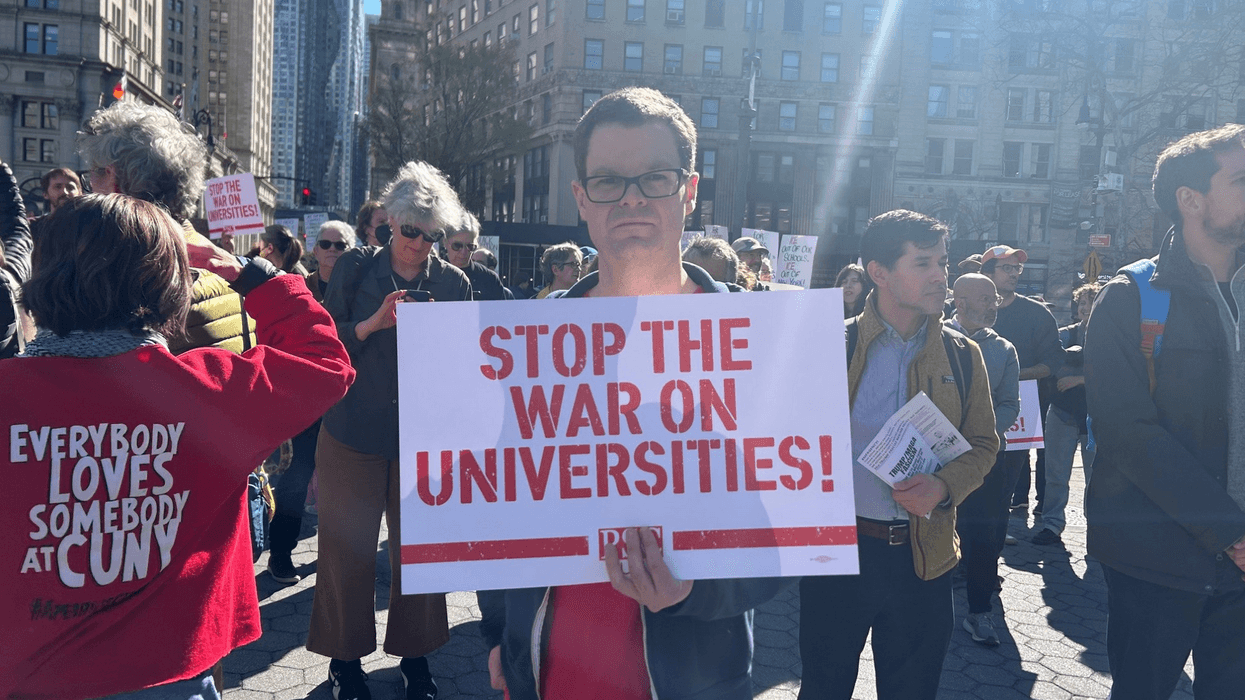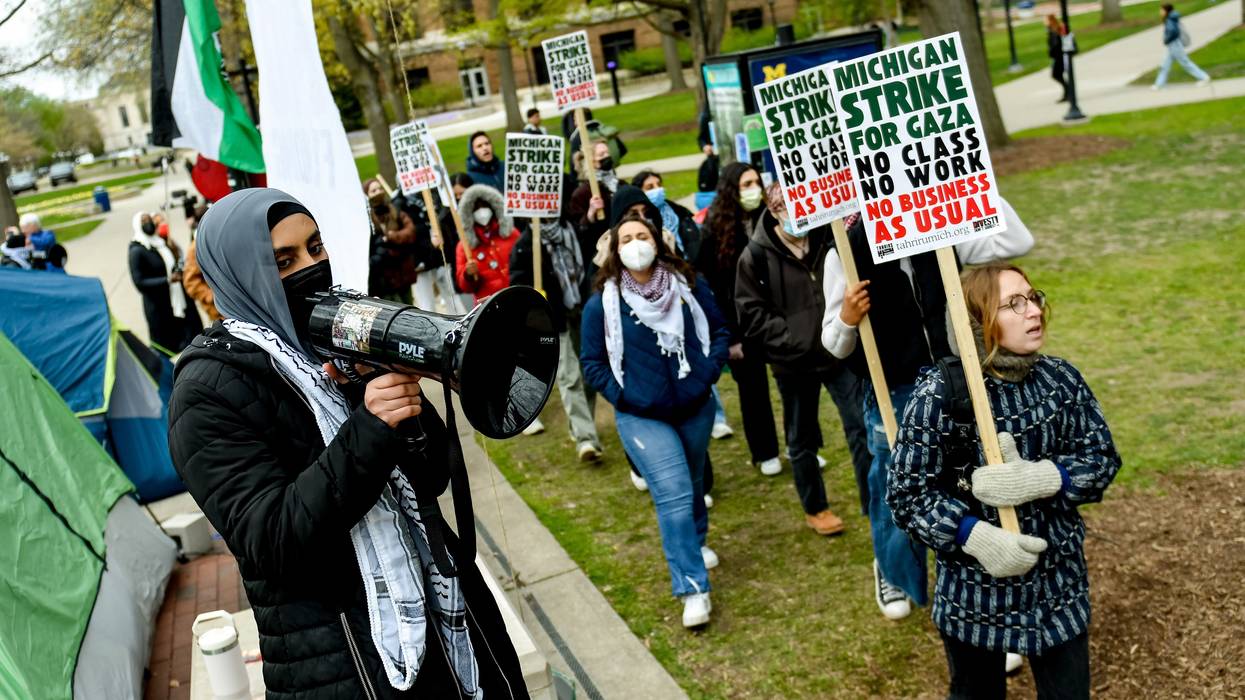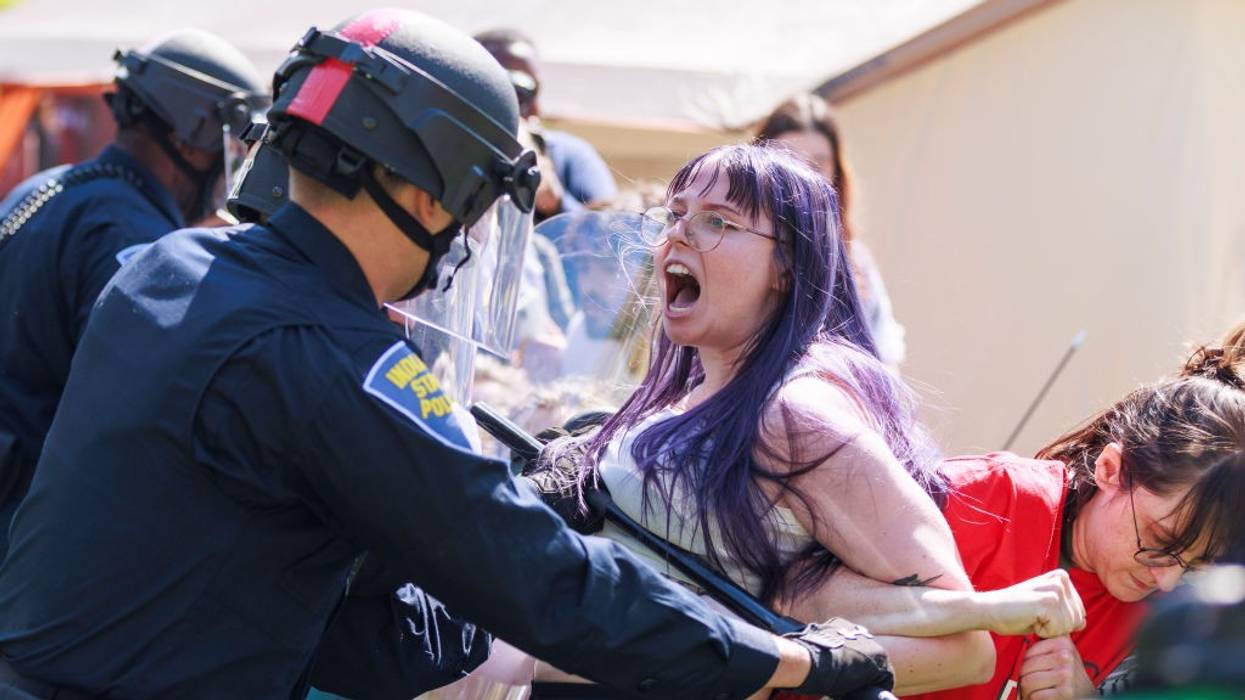Faculty-Led Movement Opposing Trump Attack on Universities Builds Steam
Weeks after the Rutgers University Senate passed a resolution to form a "mutual defense compact" with other Big Ten schools, at least four other schools have pushed forward their own proposals.
Weeks after the Rutgers University Senate passed a resolution to form a "mutual defense compact"—aiming to band together with other universities to protect from the Trump administration's attacks on academic freedom and free speech—university communities' push for their schools to stand up to the White House is gaining momentum.
Labor unions, Palestinian rights groups, and other advocacy groups on Thursday held rallies and events to mark the Day of Action for Higher Education, with students and faculty at more than 150 schools demonstrating against President Donald Trump's funding cuts; attacks on diversity, equity, and inclusion (DEI) initiatives; targeting of academic freedom; and deportation operations in which a number of student organizers have been rounded up in recent weeks.
"[ Immigration and Customs Enforcement] is abducting students," said the Debt Collective, a sponsor of the day of action. "The Trump administration is suppressing free speech. Tuition is rising and workers and staff aren't paid living wages. We need higher education to be a liberation machine, not a deportation and debt-making machine."
The signs displayed at one rally in Pittsburgh reflected the wide array of attacks Trump has launched against higher education—from billions dollars of funding cuts to the National Institutes of Health, impacting biomedical and scientific research at universities across the U.S. to the ICE arrests of international students who have spoken out against Israel's U.S.-funded assault on Gaza.
Like the mutual defense compact proposal that's now gained traction at several schools, the day of action is partially a response to Trump's demand that universities collaborate with the administration to punish students who took part in nationwide Palestinian solidarity protests last year.
Columbia University has drawn ire for reportedly giving the names of students, including organizer Mahmoud Khalil, to the Trump administration before he was detained by ICE; refusing to provide protection to Khalil and his fellow organizer, Mohsen Mahdawi, who was also arrested this week; and revoking degrees from some pro-Palestinian protesters.
In contrast, faculty senates at Big Ten schools including the University of Nebraska at Lincoln, Indiana University at Bloomington, Michigan State University, and the University of Massachusetts at Amherst have joined Rutgers in passing resolutions calling for the creation of mutual defense compacts to protect against the "legal, financial, and political incursion" of the Trump administration.
On Thursday, members of the faculty senate at the University of Michigan, also part of the Big Ten Academic Alliance, advocated for passage of a resolution to defend "academic freedom, institutional integrity, and the research enterprise"—and push back against administrators' closing of the school's DEI office at the behest of Trump's White House.
"The University of Michigan abandoned DEI in-part to avoid the wrath of Trump and most schools, not just ours, have been cowed into this kind of preemptive capitulation. Most schools, not just ours, have gone silent, just when we need them to speak up," sociology and law professor Sandra Levitsky told Michigan Advance on Thursday.
At Indiana University, Jim Sherman, a professor emeritus in psychological and brain sciences, said that while faculty members and students are calling on their institutions to form a coalition against Trump, many administrators at public universities seem to want to draw as little national attention to their schools as possible.
"I think a lot of universities are thinking, basically, 'Boy, I hope they don't come after us.' You know, 'Let them come after Columbia or Harvard or Stanford... Let them go after the big dogs,'" Sherman told Common Dreams. "Maybe if we stay quiet and don't do very much, they'll just ignore us."
But that approach will only worsen the sense of "anxiety, angst, uncertainty, [and] instability" that's spreading across college campuses today, said Sherman.
"When I was an active faculty member, the years and the job were just full of joy," he said. "My collaboration with colleagues across the U.S. and across the world were just incredible. I couldn't have wanted a happier and more fulfilling life."
"Rather than doing your teaching and research," he added, "I think the major goal right now for many of us is protection."
Sherman expressed hope that the growing support for mutual defense compacts will soon leave a critical mass of schools with no choice but to join—and ultimately place pressure on university presidents, who thus far have declined to back the movement.
"If you're in the Big Ten and suddenly five or six universities join, you don't want to be the one who's left out or not [doing] anything," said Sherman.
Outside the Big Ten, Harvard University garnered applause this week when it announced—unlike its Ivy League peer Columbia—that it will not comply with Trump's demands to expel students who took part in pro-Palestinian protest, end its recognition of Palestinian solidarity groups, or audit its programs for "viewpoint diversity." The elite university now faces a threat from Trump to have its tax-exempt status revoked.
The mutual defense compacts that have passed so far call for participating universities to "commit meaningful funding to a shared or distributed defense fund," which could potentially be used in cases like that of Indiana cybersecurity professor Xiaofeng Wang, a Chinese national whose home was raided last month by the Department of Homeland Security and FBI and who was fired by the university, or international students targeted by ICE.
"As long as different universities put their resources together, whether it's sharing information about legal issues, whether it's talking about cases that have been resolved one way or another, whether it's making funds available for the protection of faculty," Sherman said. "I think the biggest goal should simply be unification and coordination and cooperation among as many universities who want to join in as possible."
University presidents are also facing pressure from labor unions to support a mutual defense compact, with a dozen graduate students' unions affiliated with the United Electrical, Radio, and Machine Workers of America releasing a statement Wednesday.
The unions—representing tens of thousands of students at University of Minnesota, Northwestern University, North Carolina State University, and others—urged schools to establish an International Worker Support Fund and to ensure they won't "comply with ICE or other federal agencies initiating unconstitutional requests, such as sharing names and documentation statuses of students and workers or allowing ICE or other federal agents to enter campuses and university buildings."
Paul Boxer, a psychology professor at Rutgers who co-authored the original resolution at the school, emphasized that while university presidents have not yet expressed support for the mutual defense compact, support for defending First Amendment rights, academic freedom, and the diversity that thrives on many college campuses is strong among those who make up university communities.
"We do believe it's extremely important," Boxer told Common Dreams, "that faculty, staff, students, alumni, anyone connected to higher education at all, whether it's public or private, understands that universities—certainly at the level of the individuals who are providing higher education services, who are doing that kind of work, who are invested in the present and future of higher education—we are all committed to this cause."


